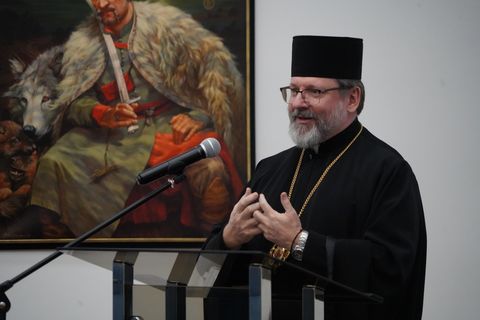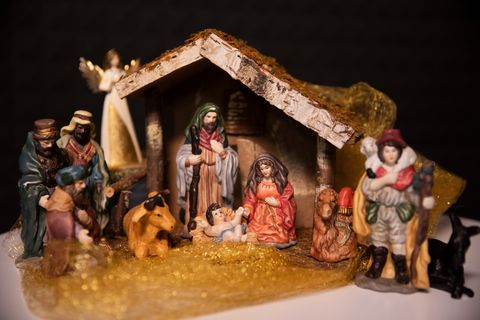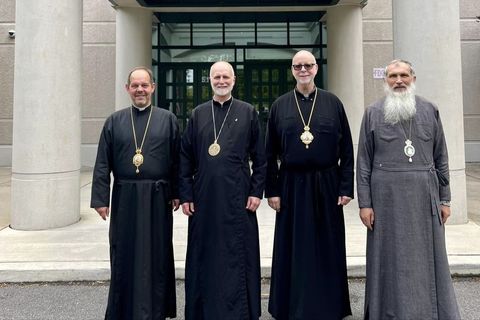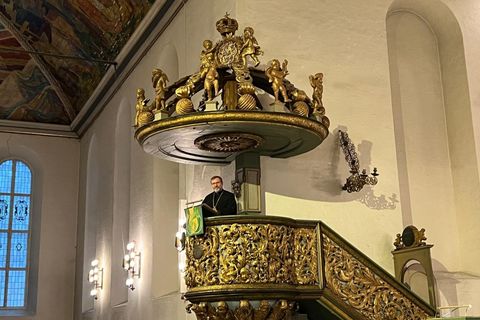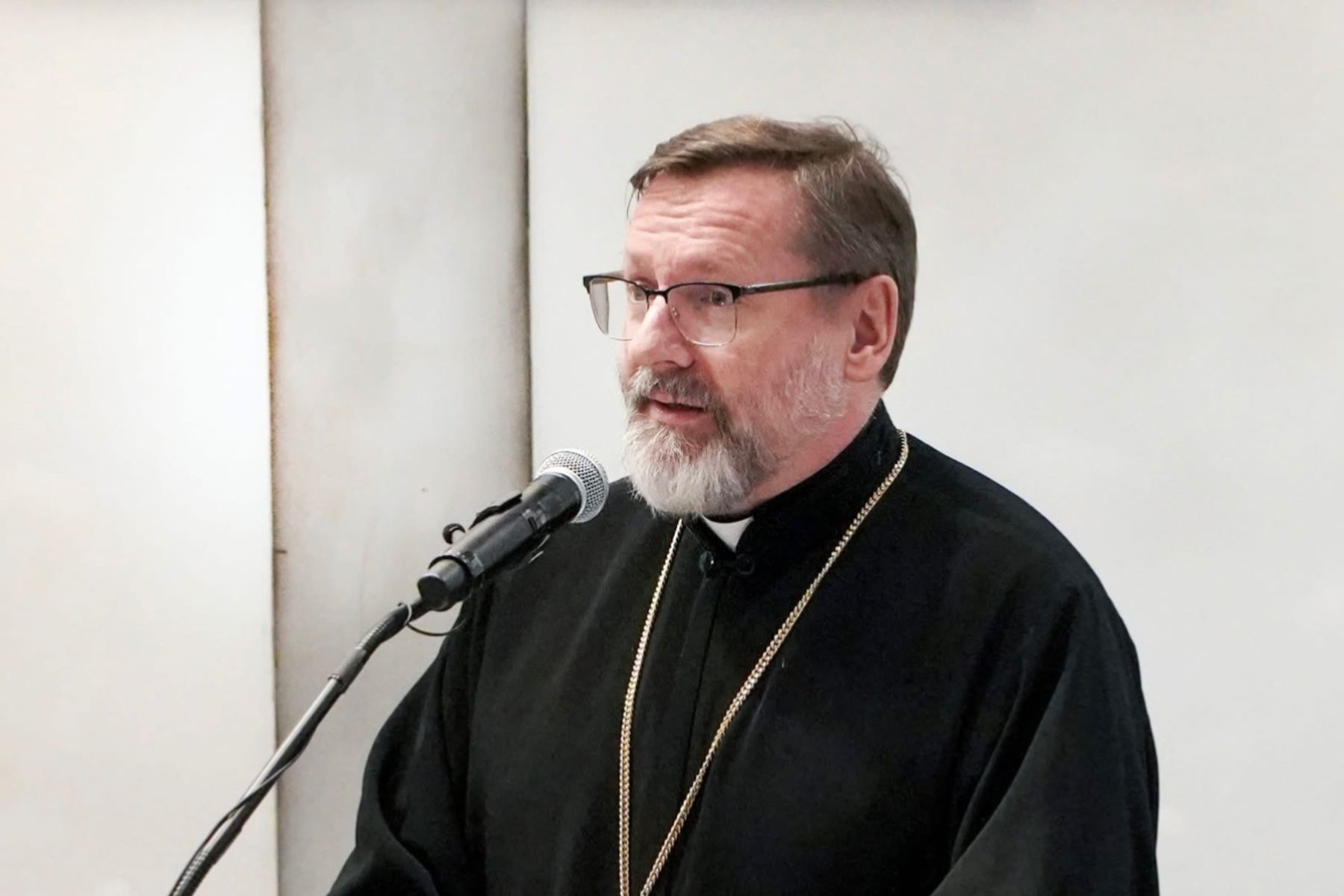
Speech of His Beatitude Sviatoslav at the Catholic University of America on War, Peace, and Hope
Thank you so very much for this wonderful introduction President Kilpatrick, I am honored to have this opportunity to speak at The Catholic University of America. My deepest thanks also to my brother Bishops, Metropolitan Archbishop Borys Gudziak, Bishop Paul Chomnycky, Bishop Benedict Aleksiychuk, Bishop Bohdan Danylo, to our reverend clergy, the religious, and my dear sisters and brothers. Your presence here gives me great hope that together we can witness to the truth about Ukraine.
February is a month when Ukraine becomes a global headline—whether due to conflicting statements from the U.S. administration and international capitals in the last hours, the full-scale Russian invasion three years ago, or the brutal killing of a hundred peaceful protesters in the heart of Kyiv eleven years past.
But today, I invite us to look beyond the headlines—beyond peace deals and bargaining, beyond minerals and economy, beyond politics and statements, beyond territorial losses and gains. In our discussion I would like to focus on people. I am not a politician or a civic leader—I am a pastor, entrusted with the care, prayer, and guidance of my people.
People possessing God-given dignity who suffer.
Children of God who desire peace.
People of peace who demand justice.
In 2014 on this very date of February 18, the then Ukrainian president Viktor Yanukovych used brutal force — riot police and snipers — against peaceful protesters in Kyiv. For three months, these demonstrators had been protesting his refusal to sign an agreement that would initiate Ukraine’s process of joining the European Union.
This movement became known as the Revolution of Dignity. The call to defend dignity united people from all walks of life: university students and industrial workers, poets and janitors, Ukrainian and Russian speakers, believers and agnostics. Dignity and solidarity became their common language, the very air they breathed. And these people—diverse in background, but united in purpose—collectively and individually decided that it was worth risking their lives to defend human dignity. Sadly, more than a hundred of them were mercilessly executed by snipers on February 18th and 20th.
Ukraine’s 2014 Revolution of Dignity was a collective realization that without respect for human life, freedom, and dignity, a just society cannot exist. Our people understood that without reverence for human life, no society can be truly free.
Russia deemed Ukraine’s stand for dignity unacceptable and began a stealth invasion to undermine the people’s struggle for dignity and independence.
The war now lasting 11 years is the same ongoing battle. This is the price the people pay for the desire to live in freedom and dignity.
The Catechism of the Catholic Church teaches that “the dignity of the human person is rooted in his or her creation in the image and likeness of God.” The Compendium of the Social Doctrine of the Church adds that “the dignity of the human person is the foundation of the moral and social order.” The Church teaches that this dignity is inherent and inalienable.
Our dignity isn’t a wish, a mere desire or ambition. It is bestowed by God, in whom we believe, who created us with dignity and freedom in His image and likeness.
This is the crux of the battle for Ukraine. A war for the dignity of people, as we now see, has become a struggle for the people’s very existence.
Those who doubt this need only listen to the stories of those released from Russian captivity, such as our two Redemptorist priests from now occupied Berdyansk, who endured 18 months in a Russian prison. They tell about beatings and tortures, humiliation and deprivations, about human dignity being shattered and trampled. We remember the mass graves in Bucha and Izyum. We remember attacks on the maternity hospital in Mariupol in spring 2022 and children hospital in Kyiv in summer 2024. Bombing apartment buildings, schools, hospitals, and shopping centers, Russia continues to kill innocent civilians. That’s why the Ukrainian defense forces continue to fight. It is not just a question of territory. We cannot abandon or surrender our people.
Allow me to share with you my insights and experiences of a country that has been at war since 2014, and, especially now, as we are within a few days of marking three years since the horrible full-scale invasion. I will begin with a brief overview of the history behind this war and the notion of a “Russian World” or Russkiy Mir, what is considered as just peace, and I will finish on the hope that the Lord brings. During the discussion I hope to describe the ministry of our Church with concrete examples.
Causes of the war
To forge a just peace, we must understand the root causes of this horrible aggression. To believe that the cause is NATO expansion or Russia’s security concerns is to repeat the Russian narrative and propaganda. NATO did not exist when Russia invaded Ukraine in the 17th and 18th centuries or at the beginning of the 20th century. The international order was not an issue in the 1930s when the Soviet Union killed Ukrainian poets, novelists and other representatives of the so-called Executed Renaissance. Ukraine was not a threat to Russian culture when the 1932–33 Holodomor was deliberately engineered, killing at least four million people through an artificially engineered famine. Ukrainian Catholic bishops, priests, monks, nuns, and faithful persecuted and arrested during the liquidation of the Ukrainian Greek Catholic Church in the 1940s were not a threat to the Church in Russia. They simply wanted to practice their faith. Yet, this fundamental right was denied to them.
This aggression as previous invasions and persecutions were motivated by a Russian imperial and eventually totalitarian mentality.
Russian twentieth century totalitarianism is rooted in the disregard for freedom and the dignity of the human person. The Catholic intellectual tradition in the words of St. Thomas Aquinas calls this “tyranny.” The letter of our synod about the war and a just peace in the context of new ideologies explains: “Totalitarian rulers seek to conquer the very soul and completely master the human personality: the subject of a totalitarian state must adore his or her tormentors. Totalitarianism thus has a pseudo-religious character. The tyrants of the twentieth century destroyed or repressed the Church because they competed with religion and wanted to replace the spiritual values of traditional religions with their own ideology.”
As we look back on the aftermath of the Second World War, we can easily see that the horrific deeds of the German Nazi totalitarianism regime met with unconditional defeat and proper moral and international juridical judgement. However, “…the second totalitarian monster, the Soviet Union with communist Russia at its core, was not only not destroyed but also appeared before the world among the victors of the war, even claiming to be the main liberator from Nazism.” The lack of a true and consequential day of reckoning calls for analysis. “A significant error of the free world after the collapse of the communist bloc was that democratic countries did not demand that post-Soviet Russia, which was recognized as the successor to the Soviet Union, condemn fully the crimes of the communist period and did not require the new Russian rulers to ensure decommunization, lustration, and purging of their state from the consequences of totalitarianism.” The lack of accountability regarding the Soviet past after the collapse of the Soviet Union has enabled modern Russian totalitarianism to take on a new life.
Yet the ideological underpinnings have changed.… “modern Russian totalitarianism… is propaganda for nihilism in its worst forms; and its goal is the moral corruption of man, his dehumanization to make him weak-willed, indifferent to moral values, a tool for crimes against humanity. It seeks to undermine faith in any moral principles and tempts its subjects with the opportunity to commit violence against others with impunity. It claims that the whole world is governed only by brutal force, deception, and self-interest. Putting forward various conspiratorial theories of a global plot against Russia, it uses them to justify any crimes committed by the Russian government against other nations. In its cult of the ruler, militarism, corporatism, open propaganda of brutal violence, and emphasis on its own national and racial superiority, the modern tyranny of Moscow has much in common with the fascism of the last century; and therefore, it is not surprising that the opposite word ‘ruscism’ (рашизм) has been coined to describe it.” This national chauvinism is clearly evident in the manner in which Ukraine and Ukrainians have been denigrated and denied by Russian authorities.
I want to remind all of us what is at stake. We must be attentive because the manner of manipulation of the media and of the very concept of truth itself is a key feature of the methodology. “The second feature of modern Russian hybrid totalitarianism is the qualitatively higher level of technical tools. […] Moscow’s ruscism effectively uses the achievements of information technology, including social media. The digital revolution helps Russian propaganda create a virtual reality that is radically different from actual reality and, what is more… Modern Russian propaganda makes use of some of the most radical movements of philosophical postmodernism from the end of the last century, which deny the existence of objective and verifiable truth and claim that there are no natural foundations of morality and law. Thus, modern Russian tyranny can be called not only hybrid but also postmodern totalitarianism.” It thrives in a cyber reality news cycle that feeds people their favorite stories reinforcing only one point of view. My dear brothers and sisters, I lived in Soviet Ukraine, I was a member of the largest underground Catholic Church. I am a first-hand witness to the logical end of this propaganda. This propaganda twists reality.
Russian World ideology
The “Russian world” refers the concept of Russia as a unique civilization that has been developed in lands that are or were part of a Russian Empire—tsarist or Soviet—as well as some border lands, in which Russian hegemony should be guaranteed or reinstated. It is explicitly neo-imperial, colonial, and virulently anti-Western. It is being used as justification for the so-called “special military operation” against Ukraine. “The role of the Moscow Patriarchate in creating and promoting this ideology is now well-documented and undeniable. The Russian Orthodox Church has given the ‘Russian World’ ideology a quasi-religious spirit, by portraying Russia as the last bastion of Christianity on earth that resists the forces of evil. At the same time, the Russian Orthodox Church confers an almost sacred status on the deadliest nuclear weapons on earth.”
Since 2022 hundreds of Orthodox theologians and intellectuals have signed a joint public letter entitled “A Declaration on the ‘Russian World’ (Russkii mir) Teaching” condemning this view as heretical, and considering it to be an example of the false doctrine of ethnophyletism (the love of one’s nation superseding love for God).
The Appeal of the Christian Churches of Ukraine to Condemn the Aggressive Ideology of the “Russkiy mir” states: “Inciting hatred and waging war based on the ‘Russian World’ ideology violates Christian principles and contradicts the spiritual norms that the Church is supposed to embody. This ideology today is a challenge to the preaching of the Gospel in the modern world and destroys the credibility of Christian witness, regardless of confession.”
Longing for just peace
Everyone living in Ukraine wants to be free to live. No one wants peace more than Ukrainians do. We didn’t start this war. Ukrainians need peace, but we want a just peace. We need a peace that will allow us to live in dignity, as Ukrainians, to be free, to worship in our churches.
However, today some of the calls we here for peace are simply unrealistic: a compromise cannot be reached if one of the parties denies the very existence of the other. Up until now Russia has left Ukraine no choice but to defend itself militarily. This war is a national struggle of liberation for the Ukrainian civil nation on behalf of the right to its own existence and future, as well as the independence, freedom, and dignity of our citizens.” Ukrainians are fighting for their very existence.
“A just peace can be neither the ‘appeasement’ of the aggressor nor a so-called ‘minimal peace’ that implies recognition of the territories occupied by the aggressor. A just peace must be long-lasting and stable, with the restoration of the principles of international law. It involves not only the aggressor’s defeat and restoration Ukraine’s territorial integrity, but also includes measures aimed at restoring proper relations between Ukraine and Russia as well as healing the wounds caused by war: the disclosure of truth and identification of criminal actors, international criminal courts, reparations, political apologies and forgiveness, memorials, new constitutions, and local reconciliation forums.”
Today Ukrainians know that evil is real — we have seen its face. “The voices of the innocently murdered, ruthlessly tortured, brutally raped, and forcibly deported are calling out to the world’s conscience. Ukrainians do not question the importance of soberly weighing threats and carefully calibrating political steps. It is equally important, however, to maintain the ability to look at current events through the eyes of the victim.”
I believe wholeheartedly that this war impacts all of humanity. It impacts our ability to distinguish good and evil. “By launching a hybrid war against Ukraine, Russia has in fact challenged the entire civilized world. Russia has disrupted it so much that many people have ceased to distinguish truth and deception, and thus good and evil.
This already prevents many politicians in the civilized world from recognizing Russian troops’ atrocities in Ukraine as genocide because it would then demand their intervention.”
The Gospel is our criterion, and objective truth remains the bedrock of society. “All of this can be overcome only by a clear and distinct proclamation of the Truth of the Gospel. If modern humanity — the humanity of the ‘post-truth era’ — does not recognize objective truth, it will gradually turn into a ‘post-justice world’.
We simply ask that the rule of law be established and followed.
Ukraine desperately needs peace. As we speak, the situation remains dire. Every day and night it suffers drones and missiles attacks hitting the residential buildings and civilian infrastructure. Even when I celebrate liturgy in Kyiv we are sometimes interrupted by these attacks. On Christmas we were forced to begin the liturgy in the crypt of our cathedral that is our bomb shelter. This Christmas God has decided to be born not in a manger but in the bomb shelter of our cathedral.
The humanitarian crisis deepens by the day. In Ukraine today, 12.7 million people are identified as “in need of humanitarian assistance.” That represents 30 % of the population, every 1 in 3 people are in need. Of those 12.7 million people, 9.9 million are non-displaced people including 2.8 million displaced people. When we speak of the whole society in Ukraine, 16.3 million Ukrainians are classified as chronically affected by the war. This means that roughly 50 % or 1 out of 2 Ukrainians are chronically suffering. Of these 16.3 million, 12.6 million are not displaced while 3.6 million are which means that 1 in 10 Ukrainians are displaced.
But most painful is the fact that Ukraine is losing its people. Tens of thousands of soldiers have sacrificed their lives, over 300,000 soldiers have been injured and are in need of rehabilitation, the entire country bears the scars of this horrific war. We are mindful as well of the toll on the economy and the infrastructure. Certainly, we will rebuild bridges and houses, we will restore our economy, but every life lost is irreplaceable.
Hope
In the midst of it all, we continue to live in hope. Hope is not just wishful thinking. Hope is the certainty that God is with us, even in the darkest night. War seeks to destroy hope, but we know that Christ has already conquered evil. No force can erase the light of His resurrection. The enemy wants to sow fear and hopelessness, but we know that our strength is in God. We will not give up, for He walks with us.
Our hope comes from our trust in God and our faith that His truth will prevail. It is strengthened by solidarity with people like you — those who are willing to hear the painful stories and yet refuse to turn a blind eye.
Fr. Omelian Kovch, a priest and martyr who was murdered in a Nazi concentration camp, wrote to his family: “I thank God for His goodness to me. Apart from heaven, this is the only place where I would want to be.” His words resonate deeply with me. I can testify that staying in Kyiv during this time of war is not just a duty, but a blessing—one that strengthens my faith, deepens my sense of purpose, and allows me to stand in solidarity with my people. Living in Kyiv I am witnessing how Ukraine is courageously standing against the aggressor. I observe the birth of a new culture — a culture of profound sacrifice and ultimate generosity. A culture which is deeply rooted in a Gospel even though people professing it sometimes would call themselves agnostics and do not have a clear notion of God. But their eyes and their sacrifice — military men and women, medical professionals, firefighters and first-responders — I see God who is faithful to His people. Who is
We live in hope because we have seen the miracle of being freed from the Soviet yoke and we have no desire to return. We live in hope because we have left the land of captivity and embarked on a journey to freedom and dignity. We live in hope because God guides us. We live in hope because we have people who support and pray for us. We live in hope — we are not alone. As Pope Francis encourages us, we are pilgrims of hope.
Join us in this witness to God, to life, to truth, to dignity, to freedom, and to hope!
† SVIATOSLAV
